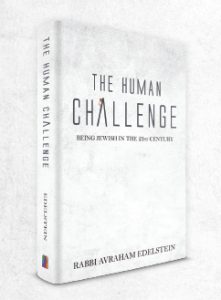
Between stimulus and response there is a space.
In that space is our power to choose our response.
In our response lies our growth and our freedom.
Viktor E. Frankl
CONDEMNED TO CHOOSE
Jean-Paul Sartre claimed that we are “condemned to freedom.” By this, he meant that I am not free because I must make choices, all the time, even when I think I have no choice to make. [1]
Is this so? We don’t get to choose birth, our first language, intelligence, basic personality — our whole genetic make-up. No one gets to choose who their parents are or whether their family would be nurturing and balanced, or rough and dysfunctional. These were G-d’s choices, not my
own, and since G-d chose them, I am not responsible. [2]
The prophet Jeremiah exhorted us: “Let not the wise person glory in his wisdom, nor the mighty man in his might, [and] let not the rich man glory in his riches,” [3] since these are all determined before a baby is born. [4] “But let he who glories, glory in this: that he understands and knows Me, that I am the L-rd that exercises on earth loving-kindness, justice and righteousness; for on these things I delight, says G-d.” Just because G-d delights in these values, He gave us complete moral autonomy over them. “Everything is in the hands of Heaven except for awe of G-d,” i.e., moral behavior, which is in the hands of man. [5]
G-d tells me what He wants my potential to be. Amongst other things, He chooses that potential based on my allotted contribution to the general fixing of the world. This potential determines my particular range of choices. But the choices I make within my range of choice define me. G-d chooses and I choose. My choices are critical in determining who I am as a moral and spiritual being. [6] And here lies the interesting thing. We all have a different range of choice; but the amount of choice we all have is the same.
[1] William Egginton.
[2] Maimonides, Mishneh Torah, Laws of Repentance 5:4.
[3] Jeremiah 9:22.
[4] Talmud, Tractate Niddah 16b.
[5] Talmud, Tractate Berachot 33b.
[6] Maimonides, Mishneh Torah, Laws of Repentance 5:1–3.
Continue reading The Threshold of Choice.
Read the previous essay, Body and Soul.
Purchase a copy of The Human Challenge.
Olami Resources is happy to present a series of free installments featuring Rabbi Avraham Edelstein’s important new book, The Human Challenge. This week’s essay is from Section One – A Purposeful Life.
Rabbi Avraham Edelstein serves as the Education Director of Neve Yerushalayim College for Women and a senior advisor to Olami. Many of Rabbi Edelstein’s foundational publications addressing the world of Kiruv appear on OlamiResources.com.



















